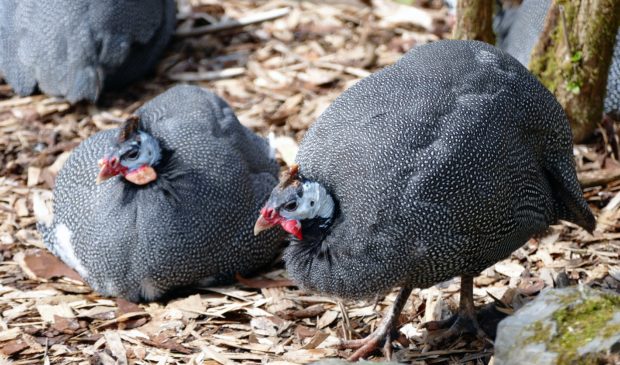Animal Advisory Commission fields outcry over Gracywoods guinea fowl
Thursday, February 18, 2021 by
Seth Smalley In Sub-Saharan Africa, where bloodthirsty predators abound, the guinea fowl’s large numbers, fast legs, and plucky dispositions help protect them from looming peril. But over 8,000 miles away, in the charming North Austin neighborhood of Gracywoods, the birds face a different sort of threat, one their sundry adaptations can’t remedy: indignant neighbors.
“I want to be clear that I am neither pro-guinea nor anti-guinea, and I feel there should be no attempt to steer the conversation in that direction,” began one such neighbor, Micah Alana, to the Feb. 8 meeting of the Austin Animal Advisory Commission. She was referencing, of course, a flock of 40 to 70 chicken-sized birds with fleshy, wattled heads, living, roosting and occasionally digging up plant beds along Barchetta Drive in North Austin. Other detractors pointed to the fowl’s obstreperous squawking, their pathogenic feces and their singular aptitude for lawn decimation. “Like locusts,” one caller put it.
Alana’s was the first of a coordinated series of calls, each centered on a separate argument against the birds and each with the final aim of legally classifying this particular flock as domesticated, which would subject the guineas to a host of city ordinances regulating their care, ownership and handling. For this to happen, the issue must first be added as an agenda item to a City Council meeting.
The disagreement has been long-in-the-making. Having made local news several times in the past, it was even mentioned in a pro-guinea blog post from over a decade ago. “From time to time, some of our neighbors complain about the Guineas,” it says. Such complaints eventually led to an official ruling that, despite their non-native status, the guineas are nevertheless considered wildlife and, accordingly, protected under city statutes.
Recently there have been neighborhood association meetings on the topic, often dominated by the anti-guinea vocal minority, according to the pro-guineaists. One account alleges that when the pro-guineaists organized to attend one of these meetings, it was promptly canceled. On Jan. 27, The Gracy Guineas Facebook page posted about certain neighbors calling private pest services to have the birds removed, a practice now condoned by Animal Services. “The Barchetta Bullies,” a Facebook commenter dubs them.
Unlike chickens, guineas are able to survive in nature without human aid, effectively foraging and fending off predators like owls and raccoons. This was among the reasons the birds were classified as wildlife in the first place. But some argue the flock was dying out due to overdevelopment and predation, and would not exist without Nazor and Ruffalo’s ongoing efforts to sustain it.
Susan Wampler, a guinea-skeptic, spoke to this point. “Mr. Craig Nazor and Mr. John Ruffalo, neighbors at the center of Barchetta Drive, have fed and maintained a growing flock of guinea fowl on our street in North Austin. Through their efforts, but with a flock of 10-20 fowl that originally roosted on undeveloped farmland at the center of Gracy Farms, is now approximately 70 birds.”
Maintenance efforts included incubating eggs, introducing new birds, and teaching existing birds how to roost in the trees at night, according to Wampler. Interestingly, Nazor himself is a member of the Animal Advisory Commission, was present for the hearing and was called by his anti-guinea neighbors to recuse himself from the vote. However, no public action was taken at the meeting, and Nazor made no comment.
But the fowl have a storied mythos in Gracywoods, one supporters consider inseparable from its identity. According to legend, Kramer Farm guinea hens were hurled to Gracywoods one evening in a windy tempest. Though they weren’t carried far – about a mile from Kramer Farm – the birds decided to settle in the grove of live oaks adjacent to Gracywoods Farm, which would later become the eponymous neighborhood.
“The reality is that these birds have been here longer than this neighborhood has been here. They represent one of the few ties that we have to the namesake and the history of our area,” said one Gracywoods local.
“Parents bring their children to see the birds and use them as a tool to teach their children about wildlife, coexistence and kindness,” said another.
Regarding the passion behind the speakers, as one pro-guinea caller finished her three minutes, “it would be a huge loss to the city if these birds were reduced,” the irate voice of a different man on the same line came in, “Jesus Christ!” He said. The hosts had forgotten to mute him. He did not share her views.
No public action was taken at the meeting.
The Austin Monitor’s work is made possible by donations from the community. Though our reporting covers donors from time to time, we are careful to keep business and editorial efforts separate while maintaining transparency. A complete list of donors is available here, and our code of ethics is explained here.
You're a community leader
And we’re honored you look to us for serious, in-depth news. You know a strong community needs local and dedicated watchdog reporting. We’re here for you and that won’t change. Now will you take the powerful next step and support our nonprofit news organization?










